海运提单条款
- 格式:pdf
- 大小:239.70 KB
- 文档页数:4
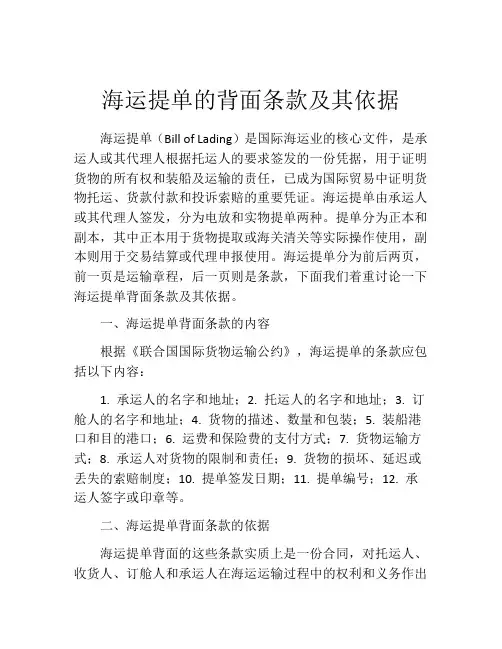
海运提单的背面条款及其依据海运提单(Bill of Lading)是国际海运业的核心文件,是承运人或其代理人根据托运人的要求签发的一份凭据,用于证明货物的所有权和装船及运输的责任,已成为国际贸易中证明货物托运、货款付款和投诉索赔的重要凭证。
海运提单由承运人或其代理人签发,分为电放和实物提单两种。
提单分为正本和副本,其中正本用于货物提取或海关清关等实际操作使用,副本则用于交易结算或代理申报使用。
海运提单分为前后两页,前一页是运输章程,后一页则是条款,下面我们着重讨论一下海运提单背面条款及其依据。
一、海运提单背面条款的内容根据《联合国国际货物运输公约》,海运提单的条款应包括以下内容:1. 承运人的名字和地址;2. 托运人的名字和地址;3. 订舱人的名字和地址;4. 货物的描述、数量和包装;5. 装船港口和目的港口;6. 运费和保险费的支付方式;7. 货物运输方式;8. 承运人对货物的限制和责任;9. 货物的损坏、延迟或丢失的索赔制度;10. 提单签发日期;11. 提单编号;12. 承运人签字或印章等。
二、海运提单背面条款的依据海运提单背面的这些条款实质上是一份合同,对托运人、收货人、订舱人和承运人在海运运输过程中的权利和义务作出明确规定。
托运人和收货人在签订合同、支付相应费用等前提条件下,取得了海运提单的所有权利和义务。
一旦承运人签发提单,他就对海上运输中货物的运输和交付负完全责任。
同时,承运人也会依据条款中规定的内容,对货物的损失、延迟和丢失承担相应责任。
因此,海运提单背面的这些条款具有法律效力。
具体来说,海运提单背面的条款依据主要包括以下几点:1. 国际惯例和国际法律法规海运提单背面的条款作为一份文书,其条款中的规定必须遵守国际法律法规和国际贸易惯例。
例如,《海洋货物运输公约》就是国际货运业一项重要的法律规范,规定了海运提单的基本内容和承运人的责任,成为海运提单条款设计的重要依据。
2. 地方性法律法规因为海运提单涉及多个国家和地区之间的交易,每个国家和地区都有不同的法律法规、行业规范以及习惯等。
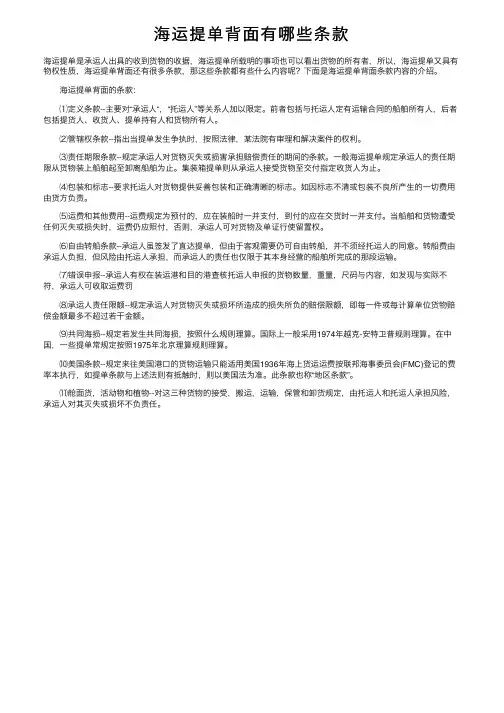
海运提单背⾯有哪些条款海运提单是承运⼈出具的收到货物的收据,海运提单所载明的事项也可以看出货物的所有者,所以,海运提单⼜具有物权性质,海运提单背⾯还有很多条款,那这些条款都有些什么内容呢?下⾯是海运提单背⾯条款内容的介绍。
海运提单背⾯的条款:⑴定义条款--主要对“承运⼈“,“托运⼈”等关系⼈加以限定。
前者包括与托运⼈定有运输合同的船舶所有⼈,后者包括提货⼈、收货⼈、提单持有⼈和货物所有⼈。
⑵管辖权条款--指出当提单发⽣争执时,按照法律,某法院有审理和解决案件的权利。
⑶责任期限条款--规定承运⼈对货物灭失或损害承担赔偿责任的期间的条款。
⼀般海运提单规定承运⼈的责任期限从货物装上船舶起⾄卸离船舶为⽌。
集装箱提单则从承运⼈接受货物⾄交付指定收货⼈为⽌。
⑷包装和标志--要求托运⼈对货物提供妥善包装和正确清晰的标志。
如因标志不清或包装不良所产⽣的⼀切费⽤由货⽅负责。
⑸运费和其他费⽤--运费规定为预付的,应在装船时⼀并⽀付,到付的应在交货时⼀并⽀付。
当船舶和货物遭受任何灭失或损失时,运费仍应照付,否则,承运⼈可对货物及单证⾏使留置权。
⑹⾃由转船条款--承运⼈虽签发了直达提单,但由于客观需要仍可⾃由转船,并不须经托运⼈的同意。
转船费由承运⼈负担,但风险由托运⼈承担,⽽承运⼈的责任也仅限于其本⾝经营的船舶所完成的那段运输。
⑺错误申报--承运⼈有权在装运港和⽬的港查核托运⼈申报的货物数量,重量,尺码与内容,如发现与实际不符,承运⼈可收取运费罚⑻承运⼈责任限额--规定承运⼈对货物灭失或损坏所造成的损失所负的赔偿限额,即每⼀件或每计算单位货物赔偿⾦额最多不超过若⼲⾦额。
⑼共同海损--规定若发⽣共同海损,按照什么规则理算。
国际上⼀般采⽤1974年越克-安特卫普规则理算。
在中国,⼀些提单常规定按照1975年北京理算规则理算。
⑽美国条款--规定来往美国港⼝的货物运输只能适⽤美国1936年海上货运运费按联邦海事委员会(FMC)登记的费率本执⾏,如提单条款与上述法则有抵触时,则以美国法为准。
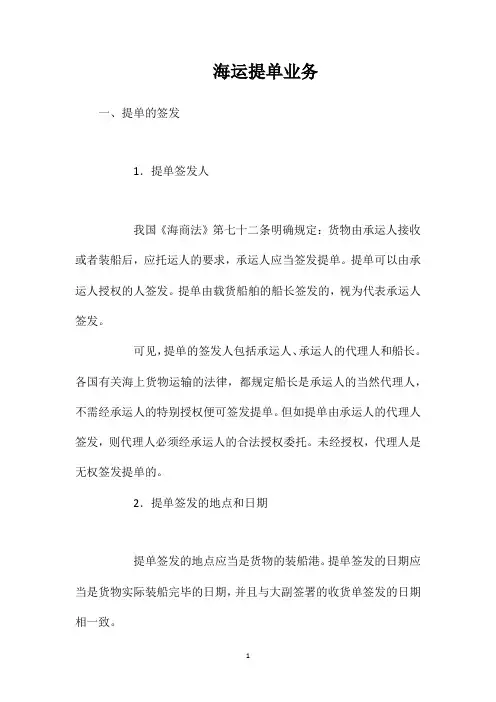
海运提单业务一、提单的签发1.提单签发人我国《海商法》第七十二条明确规定:货物由承运人接收或者装船后,应托运人的要求,承运人应当签发提单。
提单可以由承运人授权的人签发。
提单由载货船舶的船长签发的,视为代表承运人签发。
可见,提单的签发人包括承运人、承运人的代理人和船长。
各国有关海上货物运输的法律,都规定船长是承运人的当然代理人,不需经承运人的特别授权便可签发提单。
但如提单由承运人的代理人签发,则代理人必须经承运人的合法授权委托。
未经授权,代理人是无权签发提单的。
2.提单签发的地点和日期提单签发的地点应当是货物的装船港。
提单签发的日期应当是货物实际装船完毕的日期,并且与大副签署的收货单签发的日期相一致。
在国际贸易的实践中,提单签发的日期非常重要。
因为只有将货物装船后,才能辨别所装货物外表状况是否良好,件数是否与申报数字相符;同时由于货物的装运期限都是买卖双方事先约定的,而且信用证也规定了货物的装船期限,把签发提单的日期看作是货物已装船完毕的日期,也就是卖方向买方的交货日期。
如果货物装船日期一旦超过规定时间,就可能遇到买方在目的港拒收货物并请求赔偿损失和银行拒付货款的问题。
如果提单签发日期提前于货物装船完毕日期,甚至货物未装船就签发已装船提单,这就扩大了承运人的责任,也有可能构成对第三者的欺诈行为,而引起收货人拒绝提货,进而提出索赔。
提单的签发是根据大副签署的收货单,在与提单记载的各项内容核对无误后才签发的。
如果收货单上有批注,则提单签发人就应如实转批在提单上。
3.提单的份数提单有正本提单和副本提单之分。
副本提单只用于日常业务,不具有法律效力。
正本提单是一式几份,以防提单的遗失、被窃或迟延到达或在传递过程中发生意外事故造成灭失。
各国海商法和航运习惯都允许签发数份正本提单,并且各份正本提单都具有同等效力,但以其中一份提货后,其他各份自动失效。
由于正本提单是一种物权凭证,可以流通和转让,因此,承运人为防止出现利用多份正本提单进行损害提单当事人利益的非法活动,一是要求收货人凭承运人签发的全套正本提单在目的港提货,二是所有正本是在提单上注有承运人或其代理人已签署本提单一式*份,其中一份经完成提货手续后,其余各份失效等内容。
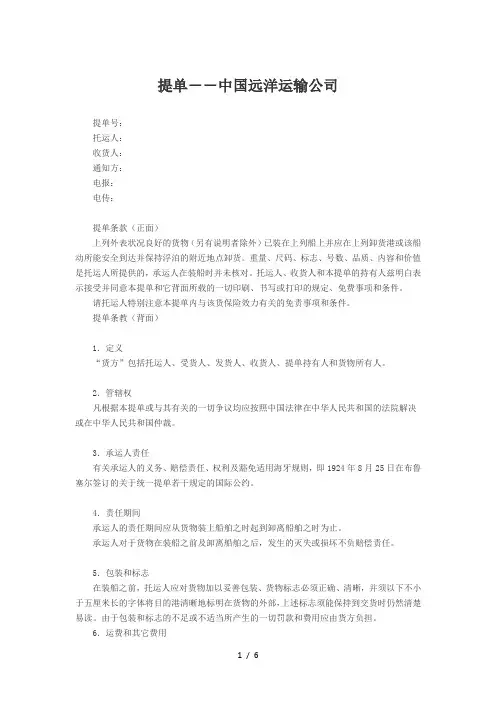
提单--中国远洋运输公司提单号:托运人:收货人:通知方:电报:电传:提单条款(正面)上列外表状况良好的货物(另有说明者除外)已装在上列船上并应在上列卸货港或该船动所能安全到达并保持浮泊的附近地点卸货。
重量、尺码、标志、号数、品质、内容和价值是托运人所提供的,承运人在装船时并未核对。
托运人、收货人和本提单的持有人兹明白表示接受并同意本提单和它背面所载的一切印刷、书写或打印的规定、免费事项和条件。
请托运人特别注意本提单内与该货保险效力有关的免责事项和条件。
提单条教(背面)1.定义“货方”包括托运人、受货人、发货人、收货人、提单持有人和货物所有人。
2.管辖权凡根据本提单或与其有关的一切争议均应按照中国法律在中华人民共和国的法院解决或在中华人民共和国仲裁。
3.承运人责任有关承运人的义务、赔偿责任、权利及豁免适用海牙规则,即1924年8月25日在布鲁塞尔签订的关于统一提单若干规定的国际公约。
4.责任期间承运人的责任期间应从货物装上船舶之时起到卸离船舶之时为止。
承运人对于货物在装船之前及卸离船舶之后,发生的灭失或损坏不负赔偿责任。
5.包装和标志在装船之前,托运人应对货物加以妥善包装、货物标志必须正确、清晰,并须以下不小于五厘米长的字体将目的港清晰地标明在货物的外部,上述标志须能保持到交货时仍然清楚易读。
由于包装和标志的不足或不适当所产生的一切罚款和费用应由货方负担。
6.运费和其它费用(1)预付运费应在装船时连同其它费用一并支付。
运费和其它费用,如已有约定而未预付,则应由货方支付,并自通知缴付运费和其它费用之日起按年息5%加付利息。
装运的货物如系易腐货物、低值货物、活动物、舱面货、以及货物的目的港无承运人的代理人时,其运费和所有其它费用必须在装船时全部付清。
到付运费连同其它费用应在船舶抵达目的港时一并支付。
预付运费和(或)到付运费,无论船舶和货物或其中之一遭受任何灭失或损坏,都应毫无例外地全部付给承运人,不予退回和不得扣减。
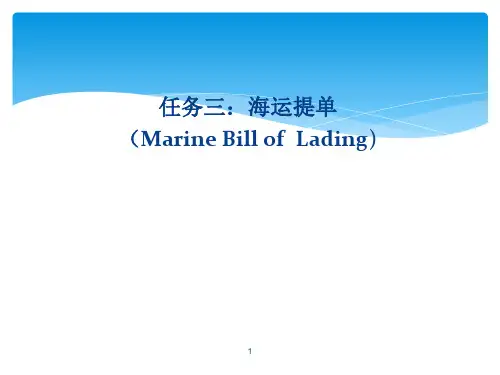

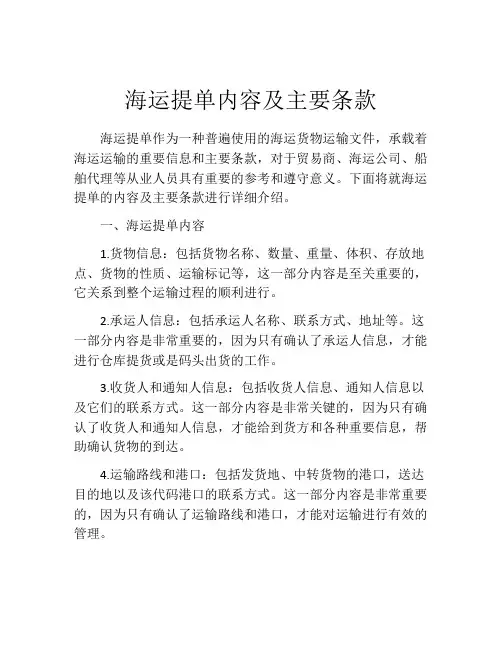
海运提单内容及主要条款海运提单作为一种普遍使用的海运货物运输文件,承载着海运运输的重要信息和主要条款,对于贸易商、海运公司、船舶代理等从业人员具有重要的参考和遵守意义。
下面将就海运提单的内容及主要条款进行详细介绍。
一、海运提单内容1.货物信息:包括货物名称、数量、重量、体积、存放地点、货物的性质、运输标记等,这一部分内容是至关重要的,它关系到整个运输过程的顺利进行。
2.承运人信息:包括承运人名称、联系方式、地址等。
这一部分内容是非常重要的,因为只有确认了承运人信息,才能进行仓库提货或是码头出货的工作。
3.收货人和通知人信息:包括收货人信息、通知人信息以及它们的联系方式。
这一部分内容是非常关键的,因为只有确认了收货人和通知人信息,才能给到货方和各种重要信息,帮助确认货物的到达。
4.运输路线和港口:包括发货地、中转货物的港口,送达目的地以及该代码港口的联系方式。
这一部分内容是非常重要的,因为只有确认了运输路线和港口,才能对运输进行有效的管理。
5.运费和付款:包括运费和付款方式,通常也会包括定期的付款周期。
这一部分内容关系到运输费用和财务交易的问题,因此具有重要的参考价值。
二、海运提单主要条款1.费用支付:这一部分主要关系到承运人的费用问题,包括货物的货款、费用以及各种附加费用的支付方式和周期。
2.装载和卸载:这一部分主要关系到卸载和装船时的工作和安全问题,包括货物放置方式、货物贮存条件以及货物的装卸方式等。
3.货物检验:这一部分主要关系到货物检验和确认问题,包括各种检验、质量确认以及试验等问题。
4.迟延责任:这一部分主要是规定了承运人对于货物迟延送达所负担的责任,包括返程、赔偿等。
5.船舶行程和运输路线:这一部分明确了转航、转包等问题,包括改运、交货等协议。
综上所述,对于海洋运输行业从业人员来说,掌握海运提单的内容及主要条款非常重要,它不仅关系到运输的顺利进行,而且还关系到各个环节的财务和交易方面。
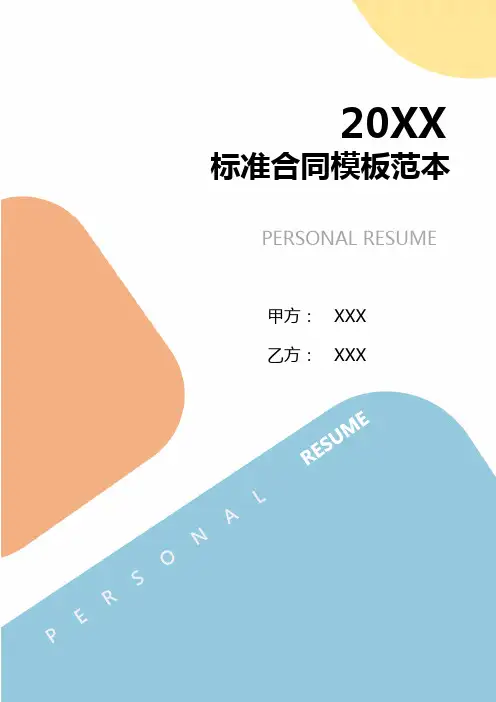
20XX 标准合同模板范本PERSONAL RESUME甲方:XXX乙方:XXX依据2024版规则的海运4.2版提单格式本合同目录一览1. 合同概述1.1 合同双方1.2 合同签订日期1.3 合同生效日期2. 货物描述2.1 货物名称2.2 货物数量2.3 货物质量2.4 货物包装3. 运输方式及路线3.1 运输方式3.2 运输路线3.3 运输期限4. 提单信息4.1 提单编号4.2 提单日期4.3 提单签发人5. 付款方式及期限5.1 付款方式5.2 付款期限5.3 利息计算6. 保险6.1 保险类型6.2 保险金额6.3 保险费用7. 违约责任7.1 货物损失或损坏7.2 延迟交货7.3 其他违约行为8. 争议解决8.1 协商解决8.2 调解解决8.3 仲裁解决8.4 法律适用9. 合同的变更和解除9.1 变更条件9.2 解除条件9.3 变更和解除的程序10. 保密条款10.1 保密信息10.2 保密期限10.3 泄露后果11. 合同的继承和转让11.1 继承条件11.2 转让条件11.3 通知义务12. 合同的附录12.1 附录一:货物描述明细表12.2 附录二:运输路线图12.3 附录三:保险条款13. 合同的签字盖章13.1 双方签字13.2 盖章13.3 签字盖章日期14. 其他条款14.1 Force Majeure(不可抗力)14.2 法律适用及争议解决14.3 合同的语言版本第一部分:合同如下:第一条合同概述1.1 合同双方甲方:(全称)地址:联系人:联系电话:乙方:(全称)地址:联系人:联系电话:1.2 合同签订日期本合同于____年__月__日签订。
1.3 合同生效日期本合同自双方签字盖章之日起生效。
第二条货物描述2.1 货物名称本合同项下的货物为(具体货物名称),共计(数量)吨。
2.2 货物数量本合同项下的货物数量为(具体数量)。
2.3 货物质量本合同项下的货物质量应符合(质量标准或规格)。
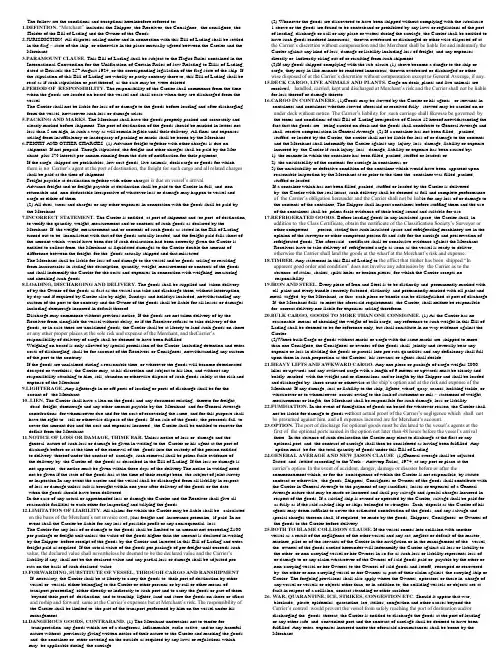
The follow are the conditions and exceptions hereinbefore referred to:1.D EFINTION. “Merchant” i ncludes the Shipper, the Receiver, the Consignor, the consignee, the Holder of the Bill of Lading and the Owner of the Goods.2.J URISDICTION. All disputes arising under and in connection with this Bill of Lading shall be settled in the flag – state of the ship, or otherwise in the place mutually agreed between the Carrier and the Merchant.3.P ARAMOUNT CLAUSE. This Bill of Lading shall be subject to the Hague Rules contained in the International Convention for the Unification of Certain Rules of law Relating to Bills of Lading, dated at Brussels the 25th August 1924, or the corresponding legislation of the flag state of the ship. If the stipulation of this Bill of Lading are wholly or partly contrary there to, this Bill of Lading shall be read as if such stipulation or part thereof, as the case may be, were deleted.4.P ERIOD OF RESPONSIBILITY. The responsibility of the Carrier shall commence from the time when the goods are loaded on board the vessel and shall cease when they are discharged from the vessel.The Carrier shall not be liable for loss of or damage to the goods before loading and after discharging from the vessel, howsoever such loss or damage arises.5.P ACKING AND MARKS. The Merchant shall have the goods properly packed and accurately and clearly marked before shipment. The port of destination of the goods should be marked in letters not less than 5 cm high, in such a way as will remain legible until their delivery, All fines and expenses arising from insufficiency or inadequacy of packing or marks shall be borne by the Merchant.6.F EIGHT AND OTHER CHARGES. (1) Advance freight together with other charges is due onshipment. If not prepaid. Though stipulated, the freight and other charges shall be paid by the Mer- chant plus 5% interest per annum running from the date of notification for their payment,If the cargo shipped are perishables, low cost goods, live animals, deck cargo or goods for which there is no Carrier’s agent at the port of destination, the freight for such cargo and all related charges shall be paid at the time of shipment.Freight payable at destination together with other char ges is due on vessel’s arrival.Advance freight and/or freight payable at destination shall be paid to the Carrier in full, and non-returnable and non-deductable irrespective of whatever loss or damage may happen to vessel and cargo or either of them.(2) All dues, taxes and charges or any other expenses in connection with the goods shall be paid bythe Merchant.7.INCORRECT STATEMENT. The Carrier is entitled, at port of shipment and /or port of destination, to verify the quantity, weight, measurement and/or contents of such goods as declared by the Merchant. If the weight, measurement and/or contents of such goods as stated in the Bill of Lading turned out to be inconsistent with that of the goods actually loaded, and the freight paid falls short of the amount which would have been due if such declaration had been correctly given the Carrier is entitled to collect from the Merchant as liquidated damages to the Carrier double the amount of difference between the freight for the goods actually shipped and that misstated.The Merchant shall be liable for loss of and damage to the vessel and/or goods arising or resulting from inaccuracies in stating the description, quantity, weight, measurement or contents of the goods and shall indemnify the Carrier for the costs and expenses in connection with weighing, measuring and checking such goods.8.LOADING, DISCHARGING AND DELIVERY. The goods shall be supplied and taken deliveryof by the Owner of the goods as fast as the vessel can take and discharge them, without interruption, by day and if required by Carrier also by night, Sundays and holidays included, notwithstanding any custom of the port to the contrary and the Owner of the goods shall be liable for all losses or damages including demurrage incurred in default thereof.Discharge may commence without previous notice, If the goods are not taken delivery of by the Receiver from alongside the vessel without delay, or if the Receiver refuses to take delivery of the goods, or in case there are unclaimed goods, the Carrier shall be at liberty to land such goods on shore or any other proper places at the sole risk and expense of the Merchant, and theCarrier’s responsibility of delivery of cargo shall be deemed to have been fulfilled.Weighing on board is only allowed by special permission of the Carrier, including detention and extra costs of discharging, shall be for account of the Receivers or Consignees, notwithstanding any custom of the port to the contrary.If the goods are unclaimed during a reasonable time, or wherever the goods will become deteriorated decayed or worthless, the Carrier may, at his discretion and subject to his lien, and without any responsibility attaching to him, sell, abandon or otherwise dispose of such goods solely at the risk and expense of the Merchant.9.LIGHTERAGE.,Any lighterage in or off ports of loading or ports of discharge shall be for the ccount of the Merchant.10..LIEN. The Carrier shall have a lien on the goods and any document relating thereto for freight,dead freight, demurrage and any other amount payable by the Merchant, and for General Average contributions for whomsoever due and for the cost of recovering the same, and for this purpose shall have the right to sell or otherwise dispose of the goods. If on sale of the goods, the proceeds fail to cover the amount due and the cost and expenses incurred , the Carrier shall be entitled to recover the deficit from the Merchant.11.NOTICE OF LOSS OR DAMAGE, THIME BAR. Unless notice of loss or damage and thegeneral nature of such loss or damage be given in writing to the Carrier or his agent at the port ofdischarge before or at the time of the removal of the goods into the custody of the person entitledto delivery thereof under the contact of carriage, such removal shall be prima facie evidence ofthe delivery by the Carrier of the goods as described in the Bill of Lading. If the loss or damage isnot apparent, the notice must be given within three days of the delivery.The notice in writing neednot be given if the state of the goods has at the time of their receipt been the subject of joint survey or inspection.In any event the carrier and the vessel shall be discharged from all liability in respectof loss or damage unless suit is brought within one year after delivery of the goods or the datewhen the goods should have been delivered.In the case of any actual or apprehended loss or damage the Carrier and the Receiver shall give all reasonable facilities to each other for inspecting and tallying the goods.12.LIMITATION OF LIABILITY. All claims for which the Carrier may be liable shall be calculatedon the basis of the Merchant’s net invoice cost, p lus freight and insurrance premuim, if paid. In no event shall the Carrier be liable for any loss of possible profit or any consequential loss.The Carrier for any loss of or damage to the goods shall be limited to an amount not exceeding £100 per package or freight unit unless the value of the goods higher than the amount is declared in writing by the Shipper before receipt of the goods by the Carrier and inserted in this Bill of Lading and extra freight paid as required. If the actual value of the goods per package of per freight unit exceeds such value, the declared value shall nevertheless be deemed to be the declared value and the Carrier’s liability if any, shall not be the declared value and any partial loss or damage shall be adjusted pro rata on the basis of such declared value.13.FORWARDING, SUBSTITUTE OF VESSEL, THROUGH CARGO AND RANSHIPMENT.If necessary, the Carrier shall be at liberty to carry the goods to their port of destination by othervessel or vessels either belonging to the Carrier or other persons or by rail or other means oftransport proceeding either directly or indirectly to such port and to carry the goods or part of them beyond their port of destination, and to tranship, lighter, land and store the goods on shore or afloat and reship and forward same at the Carrier’s expenses but at Merchant’s risk. The responsibility of the Carrier shall be limited to the part of the transport performed by him on the vessel under hismanagement.14.DANGEROUS GOODS, CONTRABAND. (1) The Merchant undertakes not to tender fortransportation any goods which are of a dangerous, inflammable, radio-active, and/or any harmful nature without previously giving written notice of their nature to the Carrier and marking the goods and the container or other covering on the outside as required by any laws or regulations whichmay be applicable during the carriage.(2) Whenever the goods are discovered to have been shipped without complying with the subclause1 above or the goods are found to be contraband or prohibited by any laws or regulations of the portof loading, discharge or call or any place or waters during the carriage, the Carrier shall be entitled to have such goods rendered innocuous, thrown overboard or discharged or other wise disposed of at the Carrier’s discretion without compensation and the Merchant shall be liable for and indemnify the Carrier against any kind of loss, damage or liability including loss of freight, and any expenses directly or indirectly rising out of or resulting from such shipment.(3)If any goods shipped complying with the sub-clause (1) above become a danger to the ship orcargo, they may in like manner be rendered innocuous, thrown overboard or discharged or other wise disposed of at the Carrier’s discretion without compensation except to General Average, if any. 15.DECK CARGO, LIVE ANIMALS AND PLANTS. Cargo on deck, plants and live animals arereceive d, handled, carried, kept and discharged at Merchant’s risk and the Carrier shall not be liable for loss thereof or damage thereto.16.CARGO IN CONTAINERS. (1)Goods may be stowed by the Carrier or his agents or servants in containers and containers whether stowed aforesaid or received fully stowed may be carried on or under deck without notice. The Carrier’s liability for such carriage shall likewise be governed bythe terms and conditions of this Bill of Lading irrespective of Clause 15 hereof notwithstanding the fact that the goods are being carried on deck and the goods shall contribute to General Average and shall receive compensation in General Average. (2) If a container has not been filled, packed,stuffed or loaded by the Carrier, the carrier shall not be liable for loss of or damage to the contents and the Merchant shall indemnify the Carrier against any injury, loss, damage, liability or expense incurred by the Carrier if such injury, loss, damage, liability or expense has been caused by:1) the manner in which the container has been filled, packed, stuffed or loaded; or2) the unsuitability of the contents for carriage in containers; or3) the unsuitability or defective condition of the container which would have been apparent uponreasonable inspection by the Merchant at or prior to the time the container was filled, packed,stuffed or loaded.If a container which has not been filled, packed, stuffed or loaded by the Carrier is deliveredby the Carrier with the seal intact, such delivery shall be deemed as full and complete performance of the Carrier’s obligation hereunder and the Carrier shall not be liab le for any loss of or damage to the contents of the container, The Shipper shall inspect containers before stuffing them and the use of the containers shall be prima facie evidence of their being sound and suitable for use.17.REFRIGERATED GOODS. Before loading goods in any insulated space, the Carrier shall, inaddition to the Class Certificate, obtain the certificate of the Classification Society’s Surveyor orother competent person, stating that such insulated space and refrigerating machinery are in the opinion of the surveyor or other competent person fit and safe for the carriage and preservation ofrefrigerated goods, The aforesaid certificate shall be conclusive evidence against the Merchant.Receivers have to take delivery of refrigerated cargo as soon as the vessel is ready to deliver, otherwise the Carrier shall land the goods at the wharf at the Merchant’s risk and expense.18.TIMBER. Any statement in this Bill of Lading to the effect that timber has been shipped “Inapparent good order and condition” does not involve any admission by the Carrier as to theabsence of stains, shakes, splits holes or broken pieces, for which the Carrier accepts noresponsibility.19.IRON AND STEEL. Every piece of Iron and Steel is to be distinctly and permanently marked with oil paint and every bundle securely fastened, distinctly and permanently marked with oil paint and metal tagged, by the Merchant, so that each piece or bundle can be distinguished at port of discharge. If the Merchant fails to meet the aforesaid requirements, the Carrier, shall neither be responsiblefor correct delivery nor liable for expenses arising therefrom.20.BULK CARGO, GOODS TO MORE THAN ONE CONSIGNEE. (1) As the Carrier has noreasonable means of checking the weight of bulk cargo, any reference to such weight in this Bill of Lading shall be deemed to be for reference only, but shall constitute in no way evidence against the Carrier(2)Where bulk Cargo or goods without marks or cargo with the same marks are shipped to morethan one Consignee, the Consignees or owners of the goods shall jointly and severally bear any expense or loss in dividing the goods or parcels into pro rata quantities and any deficiency shall fall upon them in such proportion as the Carriers, his servants or agents shall decide.21.HEAVY LIFTS AND AWKWARD CARGO. Any one piece or package of cargo weighs 2000kilos or upwards and any awkward cargo with a length of 9 meters or upwards must be clearly andboldly marked with the weight and/or dimensions and/or length by the Shipper and shall be loaded and discharged by shore crane or otherwise at the ship’s option and at the risk and expense of theMerchant. If any damage, loss or liability to the ship, lighter, wharf, quay, cranes, hoisting tackle, or whatsoever or to whomsoever occurs owing to the lack of statement or mis – statement of weight,measurement or length, the Merchant shall be responsible for such damage, loss or liability.22.FUMIGATION. In the event of fumigation of goods on board for whatever reason, the Carrier shall not be liable for damage to goods wi thout actual proof of the Carrier’s negligence which shall not be presumed against him, and all expenses incurred are for Merchant’s account.23.OPTION. The port of discharge for optional goods must be declared to the vessel’s agents at thefirst of the optional ports named in the option not later than 48 hours before the vessel’s arrivalthere. In the absence of such declaration the Carrier may elect to discharge at the first or anyoptional port and the contract of carriage shall then be considered as having been fulfilled. Any option must be for the total quantity of goods under this Bill of Lading.24.GENERAL AVERAGE AND NEW JASON CLAUSE. (1)General average shall be adjusted.Stated and settled according to the York – Antwerp Rulos, 1974, at any port or place at thecarrier’s option. In the event of accident, danger, damage or disaster before or after thecommencement which, or for the consequence of which the Carrier is not responsible, by statutecontract or otherwise, the goods, Shippers, Consignees or Owners of the goods shall contribute with the Carrier in General Average to the payment of any sacrifices, losses or expenses of a GeneralAverage nature that may be made or incurred and shall pay salvage and special charges incurred in respect of the goods, If a salving ship is owned or operated by the Carrier, salvage shall be paid for as fully as if the said salving ship or ships belonged to strangers. Such deposit as the Carrier of his agents may deem sufficint to cover the estimated contribution of the goods, and any salvage andspecial charges thereon shall, if required, be made by the goods, Shippers, Consignees or Owners of the goods to the Carrier before delivery.25.BOTH TO BLAME COLLISION CLAUSE. If the vessel comes into collision with anothervessel as a result of the negligence of the other vessel and any act, neglect or default of the master,mariner, pilot or of the servants of the Carrier in the navigation or in the management of the vessel, the owners of the goods carried hereunder will indernmify the Carrier against all loss or liability to the other or non-carrying vessel or her Owners in so far as such loss or liability represents loss ofor damage to or any claim whatsoever of the Owners of said goods paid or payable by the other or non-carrying vessel or her Owners to the Owners of said goods and setoff, recouped or recoveredby the other or non-carrying vessel or her Owners as part of their claim against the carrying ship or Carrier. The forgoing provisions shall also apply where the Owners, operators or those in charge of any vessel or vessels or objects other than, or in addition to, the colliding vessels or objects are atfault in respect of a collision, contact stranding or other accident.26. WAR, QUARANTINE, ICE, STRIKES, CONGESTION ETC. Should it appear that war,blockade, pirate, epidemics, quarantine, ice, strikes, congestion and other causes beyond theCarrier’s control would prevent the vessel from safely reaching the port of destination and/ordischarging the goods thereat, the Carrier is entitled to discharge the goods at the port of loading or any other safe and convenient port and the contract of carriage shall be deemed to have beenfulfilled. Any extra expenses incurred under the oforasaid circumstances shall be borne by theMerchant.。
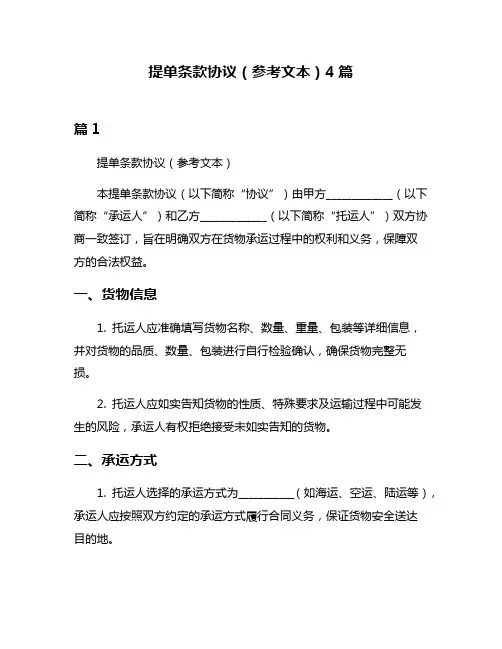
提单条款协议(参考文本)4篇篇1提单条款协议(参考文本)本提单条款协议(以下简称“协议”)由甲方_____________(以下简称“承运人”)和乙方_____________(以下简称“托运人”)双方协商一致签订,旨在明确双方在货物承运过程中的权利和义务,保障双方的合法权益。
一、货物信息1. 托运人应准确填写货物名称、数量、重量、包装等详细信息,并对货物的品质、数量、包装进行自行检验确认,确保货物完整无损。
2. 托运人应如实告知货物的性质、特殊要求及运输过程中可能发生的风险,承运人有权拒绝接受未如实告知的货物。
二、承运方式1. 托运人选择的承运方式为___________(如海运、空运、陆运等),承运人应按照双方约定的承运方式履行合同义务,保证货物安全送达目的地。
2. 托运人可根据实际需要选择不同的承运方式,需提前通知承运人并协商确定相应的运费和费用。
三、运输责任1. 承运人应对货物进行合理安全的运输,保证货物无丢失、损坏现象发生,如因承运人的过错导致货物受损失,承运人应承担相应的赔偿责任。
2. 托运人在发现货物有异常情况时,应立即通知承运人,并配合对货物进行核实,确保货物的完整性。
四、运费支付1. 运费支付方式为___________(如预付、到付、记账等),双方应根据运费支付方式按时足额支付运费,并保证运费支付的真实性和合法性。
2. 若因双方协商一致导致运费出现变动,应及时通知对方并协商确定新的运费支付方案。
五、违约责任1. 若因承运人违约导致货物损失或延误,承运人应承担相应的违约责任,并按照协议约定进行赔偿。
2. 若因托运人违约导致货物损失或延误,托运人应承担相应的违约责任,并按照协议约定进行赔偿。
六、其他事项1. 本协议经双方签字盖章后生效,协议有效期为_____________。
2. 如因不可抗力等客观原因导致无法履行协议,双方应根据情况协商解决,并按照相关法律规定处理。
以上为本提单条款协议的参考文本,具体条款可根据实际情况进行调整和补充,双方应妥善履行协议约定,共同维护双方的合法权益。
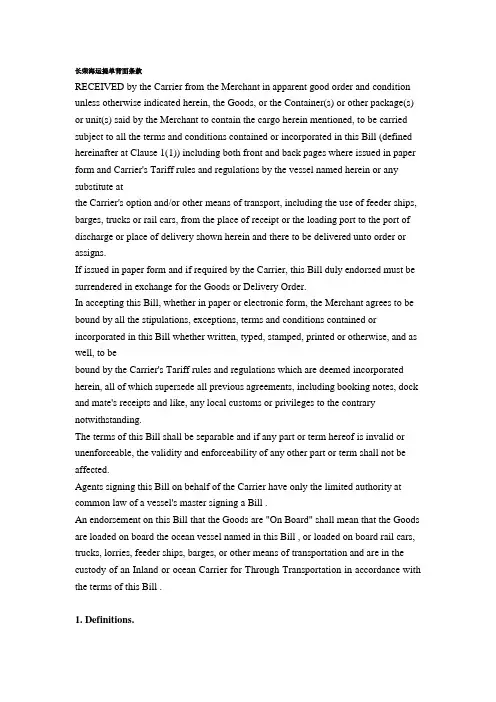
长荣海运提单背面条款RECEIVED by the Carrier from the Merchant in apparent good order and condition unless otherwise indicated herein, the Goods, or the Container(s) or other package(s) or unit(s) said by the Merchant to contain the cargo herein mentioned, to be carried subject to all the terms and conditions contained or incorporated in this Bill (defined hereinafter at Clause 1(1)) including both front and back pages where issued in paper form and Carrier's Tariff rules and regulations by the vessel named herein or any substitute atthe Carrier's option and/or other means of transport, including the use of feeder ships, barges, trucks or rail cars, from the place of receipt or the loading port to the port of discharge or place of delivery shown herein and there to be delivered unto order or assigns.If issued in paper form and if required by the Carrier, this Bill duly endorsed must be surrendered in exchange for the Goods or Delivery Order.In accepting this Bill, whether in paper or electronic form, the Merchant agrees to be bound by all the stipulations, exceptions, terms and conditions contained or incorporated in this Bill whether written, typed, stamped, printed or otherwise, and as well, to bebound by the Carrier's Tariff rules and regulations which are deemed incorporated herein, all of which supersede all previous agreements, including booking notes, dock and mate's receipts and like, any local customs or privileges to the contrary notwithstanding.The terms of this Bill shall be separable and if any part or term hereof is invalid or unenforceable, the validity and enforceability of any other part or term shall not be affected.Agents signing this Bill on behalf of the Carrier have only the limited authority at common law of a vessel's master signing a Bill .An endorsement on this Bill that the Goods are "On Board" shall mean that the Goods are loaded on board the ocean vessel named in this Bill , or loaded on board rail cars, trucks, lorries, feeder ships, barges, or other means of transportation and are in the custody of an Inland or ocean Carrier for Through Transportation in accordance with the terms of this Bill .1. Definitions.(1) "Bill" means (a) Bill of Lading if this document is issued as a Bill of Lading, or (b) Sea Waybill if this document is issued as a Sea Waybill. Notwithstandinganything else contained in or incorporated into this Bill, if it is issued as a Sea Waybill, it will not be a document of title to the Goods.(2) "Carrier" means the Vessel Provider identified on the front of this Bill doing business as Evergreen Line, which is a Joint Service Agreement as defined bythe U.S. Shipping Act. of 1984 and any amendments thereto, consisting of Evergreen Marine Corp.(Taiwan) Ltd., Evergreen Marine (UK) Ltd., ItaliaMarittima S.p.A. and Evergreen Marine (Hong Kong) Ltd.(3) "COGSA" means the United States Carriage of Goods by Sea Act, approved April 16, 1936.(4) "Container" includes any ISO standard container, trailer, transportable tank, flat rack and/or other item of transportation equipment in conformance with ISO standards.(5) Force Majeure shall include, but not be limited to, work stoppages, civil commotion, strikes, accidents, casualties, lockouts, fire, transportation disasters, acts of God, governmental restraints (including governmental import restrictions and voluntary quotas arising from the threat of governmental restraints), war or hostilities, embargoes or other similar conditions.(6) "Goods" means the cargo accepted from the Merchant and includes any Container whether supplied by or on behalf of the Carrier or by the Merchant.(7) "Hague Rules" as used herein refers to the provisions of the International Convention for the Unification of Certain Rules Relating to Bills of Lading signedat Brussels on 25th August 1924 and includes any amendments thereto including the Hague Visby Amendments, 1968.(8) "Holder" mean any person for the time being in possession of this Bill (if issued asa Bill of Lading) to whom the property in the Goods has passed on or byreason of the consignment of the Goods or the endorsement of this Bill or otherwise.(9) "Merchant" includes the shipper, Holder, consignee, the receiver of the Goods, any person owning or entitled to the possession of the Goods or this Bill andanyone acting on behalf of any such persons.(10) "Ship" shall include the vessel named in this Bill, any substituted vessel or feeder vessels, and any vessel, craft, lighter or other means of conveyancewhatsoever owned, chartered, operated or controlled and used by the Carrier in theperformance of this Contract.(11) "Through Bill " as used herein refers to the contract evidenced by this Bill when it covers the carriage of the Goods from the place of receipt from theMerchant to the place of delivery to the Merchant by the Carrier plus one or more Underlying Carriers.(12) "Through Transportation" means carriage of the Goods under this Bill from place of receipt from the Merchant to place of delivery to the Merchant by theCarrier plus one or more Underlying Carriers.(13) "Underlying Carrier" includes any water, rail, motor, air or other carrier utilized by the Carrier for any part of the transportation of the shipment covered bythis Through Bill .(14) "Sub-contractor" includes owners and operators of vessels (other than the Carrier), stevedores, terminal operators, warehousemen, Underlying Carriers, ocean and rail transport intermediaries and any independent contractor employed by the Carrier in its performance of the transportation of the Goods hereunder.Sub-contractor shall also include direct and indirect sub-contractors and their respective servants and agents.2. Carrier's Tariff. The terms of the Carrier's applicable Tariff are incorporated herein. If this Bill is issued as a Sea Waybill, the CMI Rules for Sea Waybills excluding Rule 4 are also incorporated herein. Copies of the relevant provisions of the applicable Tariff are obtainable from the Carrier upon request. Copies of theCMI Rules for Sea Waybills can be obtained from the CMI website at/. In the case of inconsistency between this Bill and the applicableTariff or CMI Rules, this Bill shall prevail.3. Merchant's Warranty. The Merchant warrants that in agreeing to the terms hereof he is, or has the authority of, the person owning or entitled to the possession ofthe Goods and this Bill .4. Sub-Contracting.(1) The Carrier shall be entitled to sub-contract on any terms the whole or any part of the carriage, loading, unloading, storing, warehousing, handling and anyand all duties whatsoever undertaken by the Carrier in relation to the Goods.(2) In contracting for the following exemptions and limitation of and exoneration from liability, the Carrier is acting as agent and trustee for all other personsnamed in this clause. It is understood and agreed that, other than the Carrier, no person, firm or corporation or other legal entity whatsoever (including theMaster, officers and crew of the vessel, all agents and all Sub-Contractors ) is, or shall be deemed to be liable with respect to the Goods as carrier, bailee orother howsoever. If, however, it shall be adjudged that any one other than the Carrier is carrier or bailee of the Goods or under any responsibility with respectthereto, all exemptions and limitations of and exoneration from liability provided by law or by terms hereof shall be available to such other. It is also agreedthat each of these persons and companies referred to above are intended beneficiaries, but nothing herein contained shall be construed to limit or to relievethem from liability to the Carrier for acts arising or resulting from their fault or neglect.5. Clause Paramount and Responsibility of Carrier.(A) Clause Paramount - as far as this Bill covers the carriage of Goods by sea either by the Carrier or its Sub-contractor, the contract evidenced in this Bill shallhave effect subject to the Hague Rules, if and as enacted in the country of shipment, and any Legislation including COGSA which make those rulescompulsory, applicable or effective. The Hague Rules and said Legislation shall be deemed contractually incorporated herein and made a part of thisContract regardless of whether it or they would otherwise be compulsorily applicable and nothing herein contained shall be deemed a surrender by the Carrieror its Sub-contractor of any of its rights and immunities or any increase of any of its responsibilities under said Rules and Act. Notwithstanding anything tothe contrary, if the carriage called for in this Bill is a shipment to or from the United States, the liability of the Carrier or its Sub-contractor shall beexclusively determined pursuant to COGSA which is contractually incorporated into this Bill. The provisions cited in the Hague Rules and COGSA (except asmay be otherwise specifically provided herein) shall also govern before the Goods are loaded on and after they are discharged from the Ship provided, however,that the Goods at said times are in the actual custody of the Carrier or anySub-contractor. When no such enactment is in force in the country of shipment, the Hague Rules will apply. If any terms of this Bill are repugnant to the Hague Rules or any other compulsorily applicable International Convention or NationalLaw which cannot be departed from by private contract, then such provision shall benull and void to the extent of such invalidity without invalidating theremaining provisions hereof. The Carrier or its Sub-contractor shall not be liable in any capacity whatsoever for any delay, non-delivery or misdelivery, orloss of or damage to the Goods howsoever caused occurring while the Goods are not in the actual custody of the Carrier.(B) Responsibility for Port to Port Shipments. Where loss or damage has occurred between the time of receipt of the Goods by the Carrier at the port of loadingand the time of delivery by the Carrier at the port of discharge, or during any prior or subsequent period of carriage by Underlying Carriers or period of custody bySub-Contractors, the liability of the Carrier shall be determined in accordance with the appropriate Hague Rules and /or other Legislation as provided in theprovisions of Clause 5A above of this Bill .(C) Responsibility for Through Transportation. Where the place of receipt or place of delivery as set forth herein are inland points or ports not directly served bythe Carrier the responsibility of the Carrier with respect to the Through Transportation of the Goods shall be as follows:(1) With respect to Through Transportation from, to or within the United States where the Goods are in the custody of a Sub-contractor such ThroughTransportation will be governed by the provisions of Clause 5B above.(2) In the event Clause 5B is held inapplicable to such Through Transportation from, to or within the United States then Carrier's liability will be governedby and subject to the terms and conditions of the Sub-contractor's bill of lading or waybill and/or the ICC Uniform Bill of Lading together with the Subcontractor's Tariff which shall be incorporated herein as if set forth at length. Notwithstanding the foregoing, in the event there is a private contractbetween the Carrier and a Sub-Contractor, responsibility for such Through Transportation will be governed by the terms and conditions of said contractwhich shall be incorporated herein as if set forth at length and copies of said contract(s) shall be available to the Merchant at any office of the Carrierupon request.(3) With respect to road carriage between countries in Europe according to the Convention on the Contract for the International Carriage of Goods by Road (CMR), dated May 19, 1956, and during rail carriage between countries in Europe according to the International Agreement on Railway Transports(CIM) dated February 25, 1961.(4) With respect to rail or road carriage within a European country then according to the internal law of such state and/or any International Convention whichis compulsorily applicable by the laws of such state. In the absence of such laws or conventions then according to the Sub-contractors contracts of carriage andtariffs, if any. Notwithstanding the above provision, road carriage in the United Kingdom according to the Conditions of Carriage 1998 of Road Haulage Association Limited.(5) With respect to carriage by road in Japan, according to the Standard Japanese Road Transportation Clauses (SJRTC). With respect to carriage by rail inJapan, according to the Japanese Railway Transportation Business Law and Ministerial Ordinance for Railway Transportation.(6) With respect to inland transportation of the Goods other than as provided in subparagraphs (1) through (5) supra, then according to the provisions of any International Convention or National Law which is compulsorily applicable in the country where the inland transportation took place or, if no such law orconvention is applicable, then according to the Sub-contractor's tariff or any contract existing between the Sub-contractor and the Carrier.(D) Extent of Liability for Through Transportation. In any event, the liability of the Carrier shall under no circumstances whatsoever be greater than that of theSub-contractor under said Sub-contractors' contract with the Carrier, and the Carrier shall be entitled to all the rights, defenses, limitations and exemptionsfrom liability contained therein.(E) Subrogation. When any claims are paid to the Merchant by the Carrier, the Carrier shall be automatically subrogated to all rights of the Merchant against allothers, including Underlying Carrier's, on account of such loss or damage.(F) In the event an action is brought in a jurisdiction in which the relevant provisions of clause 5 (A) - (E) of this Bill which are applicable to such claim are heldto be unenforceable pursuant to local law then liability for such claim shall be determined according to the internal law of the jurisdiction in which the actionis brought.6. General Limitations.(1) The Carrier does not undertake that the Goods shall arrive at the port of discharge or place of delivery at any particular time or to meet any particular marketor use and save as provided in Clause 5 the Carrier shall in no circumstances be liable for any indirect or consequential loss or damage caused by delay.(2) Save as otherwise provided herein, the Carrier shall in no circumstances be liable for direct or indirect or consequential loss or damage arising from any other cause.(3) The Carrier shall be entitled to the full benefit of all rights and immunities and all limitations of, or exemptions from, liability provided in the LondonConvention of 1976. Notwithstanding the foregoing, if local law makes the Brussels Convention of 1957 mandatorily applicable, then said latter Act will beapplicable under this Bill . The Carrier shall also be entitled to the full benefit of all rights and immunities and all limitations of, or exemptions from liabilitycontained in any national law of any nation whose laws shall be applicable.(4) Without waiver or limitation of any exemption from or limitation of liability afforded by law or by this Bill and pursuant to the United States Fire Statute, 46U.S.C., Sec. 182, neither Carrier nor any corporation owned by, subsidiary to, or associated or affiliated with Carrier shall be liable for any loss or damage wheresoever and whensoever occurring by reason of any fire whatsoever, including that occurring before loading on or after discharge from the Ship or whilethe Goods are in the custody of an Underlying Carrier, unless such fire shall have been caused by the design or neglect or by the actual fault or privity ofCarrier or such corporation, respectively. In any situation where such exemption from liability may not be permitted by law neither Carrier nor such corporationshall be liable for any such loss or damage by fire unless caused by negligence, including that imputed by law, for which Carrier or such corporation is liable, respectively.7. Amount of Compensation and Limitation of Liability.(1) All claims for which the Carrier may be liable shall be adjusted and settled on the basis of the net invoice value of the Goods plus freight and insurance. Notwithstanding the foregoing it is agreed that in no event shall this clause operate to increase the extent of the Carrier's liability beyond the applicable marketvalue at the port of discharge or place of delivery, if that be less than the net invoice value plus freight and insurance. In no event shall the Carrier be liablefor any loss of profit or any consequential loss.(2) In the event this Bill covers Goods moving to or from a port or final destination inthe United States, the Carrier's limitation of liability in respect to theGoods shall in no event exceed US$ 500 per package or, when the Goods are not shipped in packages, US$500 per customary freight unit. In the event theforegoing would be held inapplicable under the local law of the jurisdiction in which legal proceedings are brought and if the Goods covered by this Bill aresubject to the Hague Rules or any amendments thereto, including the Hague Visby Amendments, then Carrier's liability in no event shall exceed the greater of2 SDRs per kilo of gross weight of the Goods lost or damaged or 667 SDRs per package. The Merchant agrees and acknowledges that the Carrier has no knowledge of the value of the Goods, and that higher compensation than that provided herein may not be claimed unless the nature and value of such Goodshave been declared by the Merchant before shipment and agreed to by the Carrier and inserted in this Bill and any applicable Ad Valorem freight rate, as setout in Carrier's tariff, is paid.(3) If the actual value of the Goods per package or per customary freight unit exceeds such declared value, the value shall nevertheless be deemed to be thedeclared value. Any partial loss or damage shall be adjusted pro rata on the basis of such declared value. In any case, if the declared value is higher than theactual value, the Carrier shall in no event be liable to pay compensation higher than the net invoice value of the Goods plus freight and insurance.8. Notice of Claim and Time for Suit. Unless notice of loss or damage and a general nature of such loss or damage be given in writing to the Carrier at the port of discharge or place of delivery before or at the time of delivery of the Goods, or, if the loss or damage be not apparent, within three consecutive days after delivery, the Goods shall be deemed to have been delivered as described in this Bill. In any event, except as provided in the next sentence, the Carrier shall be discharged from all liability in respect of non-delivery, mis-delivery, delay, loss or damage unless suit is brought within one year after delivery of the Goods or the date when the Goods should have been delivered. Where the damage occurs in the custody of aSub-Contractor during Through Transportation, the Carrier and the Sub-Contractor shall bedischarged from all liability in respect of non-delivery, mis-delivery, delay, loss or damage unless notice of claim is filed and suit is brought within the time periods prescribed by the local laws set forth in Clause 5 (C) (1) - 5 (C) (6) of this ThroughBill .9. Defence and Limits for the Carrier. The defence and limits of liability provided for in this Bill shall apply in any action against the Carrier for loss or damageto the Goods whether the action be founded in contract or in tort.10. Shipper-Packed Containers. If a Container has not been filled, packed, stuffed or loaded by the Carrier, the Carrier shall not be liable for loss or damage to the contents and the Merchant shall indemnify the Carrier against any loss, damage, liability or expense incurred by the Carrier, if such loss, damage, liability or expense has been caused by:- (a) the manner in which the Container has been filled, packed, stuffed or loaded; or (b) the unsuitability of the contents for carriage in Containers;or (c) the unsuitability or defective condition of the Container arising without any want of due diligence on the part of the Carrier to make the Container reasonably fit for the purpose for which it is required; or (d) the unsuitability or defective condition of the Container which would have been apparent upon reasonable inspection bythe Merchant at or prior to the time when the Container was filled, packed, stuffed or loaded, or (e) the discovery of any drugs, narcotics or other illegal substanceswithin Containers packed by the Merchant or inside Goods supplied by the Merchant, and shall indemnify the Carrier in respect thereof. Any reference in this Bill to Shipped on Board or Clean on Board relates solely to the Containers and not to the contents thereof. This Bill shall be subject to Section 80113 of the U.S. FederalBills of Lading Act, 49 U.S.C. (The Pomerene Act) and it is agreed that the Carrier is entitled to that section's full protection for the entire period the Goods are in the custody of the Carrier including pre-loading and post-discharge periods.11. Inspection of Goods. The Carrier shall be entitled, but under no obligation, to open any Container at any time and to inspect the contents. If it thereupon appears that the contents or any part thereof cannot safely or properly be carried further, either at all or without incurring any additional expense or taking any measures in relation to the Container or its contents or any part thereof, the Carrier may abandon the transportation thereof and/or take any measures and/or incur any reasonable additional expense to carry or to continue the carriage or to store the same ashore or afloat under cover or in the open, at any place, which storage shall be deemed to constitutedue delivery under this Bill . The Merchant shall indemnify the Carrier against any reasonable additional expense so incurred.12. Description of Goods. The Carrier does not have facilities to weigh sealed Containers at the loading port and has neither inspected the contents of nor weighed theContainers. Any statements on this Bill relating to marks and numbers, number and kind of packages, description, quantity, quality, weight, measure, nature, kind,value or other particulars of the contents of such Container(s) are as furnished by the Merchant and are unknown to the Carrier and the Carrier accepts no liability in respect thereof. The acknowledgement of the Carrier is confined to the number and apparent order and condition of the Container(s).13. Merchant's Responsibility.(1) The Merchant warrants to the Carrier that the particulars relating to the Goods as set out overleaf have been checked by the Merchant on receipt of this Billand that such particulars and any other particulars furnished by or on behalf of the Merchant are correct.(2) The Merchant shall indemnify the Carrier against all loss, damage and expenses arising or resulting from inaccuracies in, or inadequacy of, such particulars.The right of the Carrier to such indemnity shall in no way limit his responsibility and liability under this Bill to any person other than the Merchant.(3) Containers, pallets or similar articles of transport supplied by or on behalf of the Carrier shall be returned to the Carrier in the same order and condition ashanded over to the Merchant, normal wear and tear excepted, with interiors clean and within the time prescribed in the Carrier's Tariff or elsewhere. TheMerchant of the Goods shall be jointly and severally liable for any loss of, damage to, or delay incurred during the period between handing over to the consigneeand return to the Carrier.14. Freight and Charges.(1) Freight shall be payable, at Carrier's option, on gross intake weight or measurement, or gross discharge weight or measurement, or ad valorem basis, or package orcustomary freight unit basis or any other applicable rate as set forth in Carrier's Tariff. Freight may be calculated on the basis of the description of the Goodsfurnished by the Merchant, but Carrier may at any time, weigh, measure and value the Goods and open packages or customary freight units to examine contents. Incase the Merchant's description is found to be erroneous and additional freight ispayable, the Merchant shall be liable for any additional freight and expenseincurred in examining, weighing, measuring, fumigating and valuing the Goods. (2) Full freight to the port of discharge or in case of Through Transportation to place of delivery named herein and all advance charges against the Goods shall be considered completely earned on receipt of the Goods by the Carrier or Underlying Carrier as the case may be, whether the freight or charges be prepaid or bestated or intended to be prepaid or to be collected at port of discharge or destination or subsequently, and the Carrier shall be entitled absolutely, to all freightand charges, whether actually paid or not, and to receive and retain them under all circumstances whatever, the Ship and/or the Goods lost or not lost, or thevoyage changed, broken up, frustrated or abandoned. Full freight shall be paid whether the Goods be damaged or lost, or packages or customary freight unitsbe empty or partly empty.(3) All freight and charges shall be paid in full and without any offset, counterclaim or deduction, in the currency named in this Bill or, at the Carrier's option, inits equivalent in local currency at bank demand rates of exchange in New York as of the date payment of freight shall be due hereunder. Any error in freightor in charges or in the classification herein of the Goods is subject to correction, and if on correction, the freight or charges are higher, Carrier may collect theadditional amount.(4) The Merchant of the Goods shall be jointly and severally liable to Carrier for the payment of all freight, Bunker Adjustment Factor (BAF), CurrencyAdjustment Factor (CAF), Terminal Handling Charge (THC), demurrage, detention, General Average, salvage and other charges, including but not limited tocourt costs, expenses and reasonable attorney's fees incurred in collecting sums due to the Carrier. Payment of ocean freight and charges to a freight forwarder,broker or anyone other than the Carrier, or its authorized agent, shall not be deemed payment to the Carrier and shall be made at payer's sole risk.15. Lien. The Carrier shall have a lien on the Goods and any documents relating thereto for all sums payable to the Carrier under this Bill or any other contracts with the Merchant and expenses incurred by the Carrier for the account of the Merchant and for General Average and Salvage contributions to whomsoever due and for the cost of recovering the same and shall be for the account of the Goods and the Merchant jointly and severally and the Carrier shall have the right in its absolutediscretionto dispose of the Goods and/or to sell the Goods by public auction or private treaty without notice to the Merchant.16. Optional Stowage.(1) The Goods may be stowed by the Carrier in Containers or similar articles of transport used to consolidate Goods.(2) Goods stowed in Containers whether by the Carrier or the Merchant, may be carried on or under deck without notice to the Merchant. Goods (other than live animals) stowed in any covered-in space or loaded in Containers, vans or trailers carried on deck shall be deemed to be stowed under deck for all purposes,including General Average and the COGSA, the Hague Rules or other compulsorily applicable legislation.17. Deck Cargo. Goods which are stated herein to be carried on deck , whether or not carried on deck, are carried without responsibility on the part of the Carrier forloss or damage of whatsoever nature arising during carriage by sea whether caused by unseaworthiness or negligence or any other cause whatsoever.18. Special Container.(1) The Carrier shall not undertake to carry the Goods in refrigerated, heated, insulated, ventilated or any other special Container(s) nor to carry specialContainer(s) packed by or on behalf of the Merchant, as such; but the Carrier will treat such Goods or Container(s) only as ordinary goods or dry Container(s) respectively, unless special arrangements for the carriage of such Goods or Container(s) have been agreed to in writing between the Carrier and the Merchant and unless such special arrangements are noted on the face of this Bill and all special freight, as required, has been paid. The Carrier shall not accept responsibilityfor the function of special Container(s) supplied by or on behalf of the Merchant. (2) As regards the Goods which have been agreed to be carried in special Container(s), the Carrier or its Sub-contractors shall not be responsible for control andcare of the refrigeration units of such Container(s) when the Containers are not in the actual possession of the Carrier. The Carrier does not warrant the refrigerating machinery and the Carrier shall not be liable for any loss of or damage to the Goods caused by latent defect in the refrigeration equipment.(3) If the Goods have been packed into refrigerated Container(s) by the Carrier and the particular temperature range requested by the Merchant is inserted in this。
海运提单内容条款及法律介绍海运提单内容条款及法律介绍一、引言海运提单是一种重要的国际贸易文件,用于确认货物的收货人和货物的装载状态。
本文旨在详细介绍海运提单的内容条款以及相关法律知识,以便参与国际贸易的相关方了解和应用。
二、合同相关条款2.1 货物描述海运提单应清楚地描述货物的品名、数量、规格、包装等信息,以确保准确描绘货物的性质和特征。
2.2 装运港和目的港提单应明确注明货物的装运港和目的港以及其他必要的装运和交货信息,以确保货物的顺利运输。
2.3 运费和费用分担提单应明确注明运费和费用的支付责任以及双方的分担比例,以便双方在运输过程中进行费用的结算。
2.4 装运日期和交货日期提单应记录货物的装运日期和预计交货日期,以便双方能够掌握货物运输的时间节点。
三、货物运输条款3.1 装运方式提单应明确注明货物的装运方式,如整箱、拼箱或散货等,以确保货物能够按照合同约定的方式进行装运。
3.2 货物包装和标记提单应指明货物的包装和标记要求,以确保货物在运输过程中能够得到充分保护和辨识。
3.3 货物的运输和交付提单应详细描述货物的运输路线和交付方式,以确保货物能够按照约定的路径和方式进行运输和交付。
四、责任和赔偿条款4.1 货物损失和延误提单应明确规定对于货物损失和延误的责任以及赔偿的方式、标准和限制,以确保在货物运输过程中发生问题时相关方的权益得到保护。
4.2 重大事故和不可抗力提单应明确规定对于因重大事故或不可抗力造成的货物损失或延误的责任和赔偿方式,以确保在不可预见情况下相关方的权益得到保护。
五、申诉和争议解决条款5.1 申诉和索赔程序提单应明确规定申诉和索赔的程序和时限,以便在出现问题时相关方能够及时提出申诉和索赔。
5.2 争议解决方式提单应明确规定争议解决的方式,如仲裁、诉讼等,以确保争议能够得到有效解决。
附件:本所涉及附件如下:附件1:样品合同附件2:装箱单附件3:运输保险单法律名词及注释:1. 装运港:货物装上船或离开物流枢纽的港口。
一、提单正面内容目前,各船公司所制定的提单虽然格式不完全相同,但其内容大同小异。
现介绍如下:1.必要记载事项根据我国《海商法》第七十三条规定,提单正面内容,一般包括下列各项:(1)货物的品名、标志、包数或者件数、重量或体积,以及运输危险货物时对危险性质的说明:(Description of the goods,mark,number of packages or piece,weight or quantity,and a statement,if applicable,as to the dangerous nature of the goods);(2)承运人的名称和主营业所(Name and principal place of business of the carrier);(3)船舶的名称(Name of the ship);(4)托运人的名称(Name of the shipper);(5)收货人的名称(Name of the consignee);(6)装货港和在装货港接收货物的日期(Port of loading and the date on Which the good were taken over by the carrier at the port of loading);(7)卸货港(Port of discharge);(8)多式联运提单增列接收货物地点和交付货物地点(Place where the goods were taken over and the place where the goods are to be delivered in case of a multimodal transport bill of lading);(9)提单的签发日期、地点和份数(Date and place of issue of the bill of loading and the number of originals issued);(10)运费的支付(Payment of freight);(11)承运人或者其代表的签字(Signature of the carrier or of a person acting on his behalf)。
海运提单内容和主要条款(一)一、提单正面内容目前,各船公司所制定的提单虽然格式不完全相同,但其内容大同小异。
现介绍如下:1.必要记载事项根据我国《海商法》第七十三条规定,提单正面内容,一般包括下列各项:(1)货物的品名、标志、包数或者件数、重量或体积,以及运输危险货物时对危险性质的说明:(Description of the goods, mark, number of packages or piece, weight or quantity,and a statement, if applicable, as to the dangerous nature of the goods);(2)承运人的名称和主营业所(Name and principal place of business of the carrier);(3)船舶的名称(Name of the ship);(4)托运人的名称(Name of the shipper);(5)收货人的名称(Name of the consignee);(6)装货港和在装货港接收货物的日期(Port of loading and the date on Which the good were taken over by the carrier at the port of loading);(7)卸货港(Port of discharge);(8)多式联运提单增列接收货物地点和交付货物地点(Place where the goodswere taken over and the place where the goods are to be delivered in case of amultimodaltransport bill of lading);(9)提单的签发日期、地点和份数(Date and place of issue of the bill of loading and the numberof originals issued);(10)运费的支付(Payment of freight);(11)承运人或者其代表的签字(Signature of the carrier or of a person acting on his behalf)。
海运提单内容及主要条款海运提单内容及主要条款一、提单正面内容目前,各船公司所制定的提单虽然格式不完全相同,但其内容大同小异。
现介绍如下:1.必要记载事项根据我国《海商法》第七十三条规定,提单正面内容,一般包括下列各项:(1)货物的品名、标志、包数或者件数、重量或体积,以及运输危险货物时对危险性质的说明:(Description of the goods,mark,number of packages or piece,weight or quantity,and a statement,if applicable,as to the dangerous nature of the goods);(2)承运人的名称和主营业所(Name and principal place of business of the carrier);(3)船舶的名称(Name of the ship);(4)托运人的名称(Name of the shipper);(5)收货人的名称(Name of the consignee);(6)装货港和在装货港接收货物的日期(Port of loading and the date on Which the good were taken over by the carrier at the port of loading);(7)卸货港(Port of discharge);(8)多式联运提单增列接收货物地点和交付货物地点(Place where the goods were taken over and the place where the goods are to bedelivered in case of a multimodal transport bill of lading);(9)提单的签发日期、地点和份数(Date and place of issue of the bill of loading and the numberof originals issued);(10)运费的支付(Payment of freight);(11)承运人或者其代表的签字(Signature of the carrier or of a person acting on his behalf)。
《海商法》关于提单背面条款-回复提单背面条款是海商法中的重要内容之一,它规定了海运合同当事人之间的权利和义务。
本文将逐步回答与《海商法》中关于提单背面条款相关的问题。
一、什么是提单背面条款?提单背面条款是指存在于国际海运提单背面的一系列约定。
提单是一种证明货物交接的重要文件,背面的条款是对海运合同进行补充和约定的内容。
提单背面条款可以规定关于货物的性质、数量、包装、运费支付、保险责任等事项。
它具有法律约束力,当事人在签署提单时就默认接受了背面条款的约定。
二、提单背面条款的主要内容有哪些?《海商法》中关于提单背面条款的规定主要包括货物描述、数量和包装、运费和货损等多个方面。
1. 货物描述:提单背面条款会详细描述货物的性质、品名、规格、重量和体积等信息,以确保可追溯性和准确性。
2. 数量和包装:提单背面条款还会规定货物的数量和包装方式,以保证货物在运输过程中的安全性和完整性。
3. 运费和货损:提单背面条款会约定运输费用的支付方式和期限,同时规定货损的承担责任和索赔程序。
以上是提单背面条款的一些主要内容,实际上还可以根据当事人的需求进行具体的约定。
三、提单背面条款的作用是什么?提单背面条款具有以下几个作用:1. 约定权利和义务:提单背面条款明确了海运合同当事人之间的权利和义务,减少了争议和合同纠纷的可能性。
2. 保护当事人权益:提单背面条款规定了货物的描述、数量和包装等信息,能够确保货物在运输过程中的安全性和完整性。
3. 规范合同行为:提单背面条款作为法律文件,对当事人的行为进行了规范,增加了合同的可预见性和稳定性。
四、提单背面条款是否可以修改?根据《海商法》的规定,如果提单背面条款已经载明,海运承运人在对提单签发之前不能擅自修改,否则将面临违约责任。
然而,在一些特殊情况下,提单背面条款可以被特别约定或协商修改。
当事人可以根据实际情况和需求通过合法授权的形式对条款进行修订。
五、提单背面条款的违约和争议解决如何处理?当提单背面条款被违反时,受损害方可以提起违约诉讼来维护自己的权益。
完整的海运提单样本_图文1中远COSCO集装箱提单背面条款(中文)中远集团提单背面条款1. DEFINItionS 定义“承运人”(CARRIER)是指“中远集运”,即中远集装箱运输有限公司。
“货方”(MERCHANT)包括发货人、托运人、收货人、受货人、货主、本提单的合法持有人或被背书人,或与货物或本提单具有现时或未来利益关系的任何人,或被授权代表前述任何一方行事的任何人。
“船舶”按有关上下文情况,包括本提单第6栏所列船舶或其替代船舶,以及承运人或代表承运人于全部运程中的海运阶段所使用的任何支线船或驳船。
“分立契约人”(SUB-CONTRACTOR)包括(除承运人以外的)船舶所有人及经营人,装卸工人,码头、仓库、集装箱储运站经营人及拼箱经营人,公路及铁路运输经营人,及承运人雇佣的用以进行运输的任何独立订约人,以及其小分立契约人(SUB-SUB-CONTRACTOR)。
分立契约人一词应包括直接及间接分立契约人及其各自的受雇人、代理人或分立契约人。
“货物”(GOODS)是指自货方收到的全部货物或其任何部分,并包括非由承运人或其代表提供的任何集装箱。
“件”是指由货方或其代表装载并铅封的每一集装箱,而不是在集装箱中所装的货物件数,如果此项件数未在本提单正面列明,或者是用“据称内装”或类似词句列明。
“装运单位”(SHIPPING unit)是指未以包件运输的任何一个具体单位的货物,包括机械、车辆及船只,但散装货物除外。
“集装箱”(CONTAINER)包括任何集装箱,如开顶集装箱、拖车、可运油罐、框架箱、平板箱、货盘,以及为运输货物而使用的任何其他设备或设施。
本条作为定义条款,用以说明、规定本提单条款中经常出现的一些名词,以便明确在为提单所证明或构成的运输合同中所代表的概念、避免理解上的差异。
有关承运人的定义与提单正面的抬头和承运人签单部位的落款相对应,符合《跟单信用证统一惯例500》对提单签发的要求。
本提单所构成或证明运输合同中的承运人仅指中远集运、而非任何其他相关的契约承运人、实际承运人,这样避免了当存在几个运输合同时发生混淆。
一、提单正面内容目前,各船公司所制定的提单虽然格式不完全相同,但其内容大同小异。
现介绍如下:1.必要记载事项根据我国《海商法》第七十三条规定,提单正面内容,一般包括下列各项:(1)货物的品名、标志、包数或者件数、重量或体积,以及运输危险货物时对危险性质的说明:(Description of the goods,mark,number of packages or piece,weight or quantity,and a statement,if applicable,as to the dangerous nature of the goods);(2)承运人的名称和主营业所(Name and principal place of business of the carrier);(3)船舶的名称(Name of the ship);(4)托运人的名称(Name of the shipper);(5)收货人的名称(Name of the consignee);(6)装货港和在装货港接收货物的日期(Port of loading and the date on Which the good were taken over by the carrier at the port of loading);(7)卸货港(Port of discharge);(8)多式联运提单增列接收货物地点和交付货物地点(Place where the goods were taken over and the place where the goods are to be delivered in case of a multimodal transport bill of lading);(9)提单的签发日期、地点和份数(Date and place of issue of the bill of loading and the number of originals issued);(10)运费的支付(Payment of freight);(11)承运人或者其代表的签字(Signature of the carrier or of a person acting on his behalf)。
提单缺少前款规定的一项或者几项的,不影响提单的性质,但是,提单应当符合该法第七十一条的规定。
上述规定说明:缺少其中的一项或几项的,不影响提单的法律地位,但是必须符合海商法关于提单的定义和功能的规定。
除在内陆签发多式联运提单时上述第三项船舶名称;签发海运提单时多式联运提单的接收货地点和交付货物的地点以及运费的支付这3项外,其他8项内容是必不可少的,目前各船公司制定的提单其内容与此相仿。
2.有关提单的国际公约对必要记载事项的规定根据《海牙规则》第三条第三款的规定:在收到货物之后,承运人或船长或承运人的代理人,应依照托运人的请求签发给托运人提单,其上载有:(1)与开始装货前由托运人书面提供者相同,为辨认货物所需的主要标志;(2)由托运人书面提供的包数或件数,或者数量,或者重量;(3)货物的表面状况。
另外,《海牙规则》第三条第四款还规定:"这种提单应当作为承运人依照第三款(1)、(2)、(3)项所述收到该提单中所载货物的表面证据。
"对《海牙规则》作出修改的《维斯比规则》,对《海牙规则》规定的必要记载事项未加以修改但对这些记载内容的证据效力,却作了修订,规定:"……但是,当提单已经转让给善意的第三方时,与此相反的证据不予采用。
"这段对《海牙规则》规定的证据效力所作出的补充文字,在法律上为承运人规定了一项义务,即对于善意的第三方,承运人应对提单上所记载的有关货物的事项负责,不能以事实上货物未装船来抗辩。
这样,提单上有关货物的记载就成为按照提单记载内容收到货物的最终证据了。
《汉堡规则》关于提单必须记载的内容则作出详细的规定,在第十五条第一款中共列出了15项必须记载的事项:(1)货物的品名、标志、包数或件数,或者重量或以其他方式表示的数量,如系危险货物,则对其危险性质的明确说明,这些资料均由托运人提供;(2)货物的外表状态;(3)承运人名称及其主要营业所所在地;(4)托运人名称;(5)托运人指定收货人时的收货人名称;(6)海上运输合同规定的装货港,以及货物由承运人在装运港接管的日期;(7)海上运输合同规定的卸货港;(8)正本提单超过一份时的份数;(9)提单签发地点;(10)承运人及其代表的签字;(11)收货人应付运费金额,或者应由收货人支付运费的其他说明;(12)关于货物运输应遵守该规则各项规定,凡是与此相背离的,有损于托运人或收货人的条款均属无效的声明;(13)货物应在或可在舱面装运的声明;(14)经承运人与托运人明确协议的货物在卸货港的交付日期或期限;1(15)承运人与托运人约定的高于该规则的承运人责任限额。
《汉堡规则》第十五条第三款还规定:"提单漏列本条所规定的一项或多项,不影响该单证作为提单的法律性质,但该单证必须符合第一条第七款(提单定义)规定的要求。
"关于提单必要记载事项的证据效力,《汉堡规则》第十六条中作出了与《维斯比规则》相同的规定。
即承运人签发了已装船提单,则认为提单上所述货物已装船的初步证据,当提单转让给包括收货人在内的善意的第三方时,提单上的记载内容具有最终证据的效力。
3.一般记载事项(1)属于承运人因业务需要而记载的事项:如航次顺号、船长姓名、运费的支付时间和地点、汇率、提单编号及通知人等。
(2)区分承运人与托运人之间的责任而记载的事项:如数量争议的批注;为了减轻或免除承运人的责任而加注的内容;为了扩大或强调提单上已印妥的免责条款;对于一些易于受损的特种货物,承运人在提单上加盖的以对此种损害免除责任为内容的印章等。
(3)承运人免责和托运人作承诺的条款,如中远提单正面右下方的3段文字说明:①"上列外表状况良好的货物(除另有说明者除外),己装在上列船上,并应在上列卸货港或该船以能安全到达并保持浮泊的附近地点卸货物。
""重量、尺码、标志、号数、品质、内容和价值是托运人所提供的,承运人在装船时并未核对。
托运人、收货人和本提单持有人兹明确表示接受并同意本提单和它背面所载的一切印刷、书写或打印的规定、免责事项和条件。
"②"为证明以上所述,承运人或其代理人已签署本提单(若干份),其中一份经完成的提货手续后,其余各份失效。
"③"请托运人特别注意本提单内与该货保险效力有关的免责事项和条件。
"根据我国《海商法》第七十七条规定:除非承运人按有关规定作出保留外,承运人或者代其签发提单的人签发的提单,是承运人已经按照提单所载状况收到货物或者货物已经装船的初步证据;承运人向善意受让提单的包括收货人在内的第三人提出的与提单所载状况不同的证据,不予承认。
《海牙--维斯比规则》和《汉堡规则》也有类似的规定,就提单上有关货物记载事项的证据效力所作的规定。
鉴于上述规定,在目的港卸货时,如果货物的实际状况与提单上记载的不一致,由此给收货人带来的损失,除法律另有规定外,承运人应负赔偿责任。
承运人只要能证明上述的不一致是托运人的原因造成的,则他们可以向托运人追偿。
(二)提单的背面条款提单背面的条款,作为承托双方权利义务的依据,多则三十余条,少则也有二十几条,这些条款一般分为强制性条款和任意性条款两类。
强制性条款的内容不能违反有关国家的法律和国际公约、港口惯例的规定。
我国《海商法》第四章海上货物运输合同的第四十四条就明确规定:"海上货物运输合同和作为合同凭证的提单或者其他运输单证中的条款,违反本章规定的,无效。
"《海牙规则》第三条第八款规定:"运输契约中的任何条款、约定或协议,凡是解除承运人或船舶由于疏忽、过失或未履行本条规定的责任与义务,因而引起货物的或与货物有关的灭失或损害,或以本规则规定以外的方式减轻这种责任的,都应作废并无效。
"上述的规定都强制适用提单的强制性条款。
除强制性条款外,提单背面任意性条款,即上述法规、国际公约没有明确规定的,允许承运人自行拟定的条款,和承运人以另条印刷、刻制印章或打字、手写的形式在提单背面加列的条款,这些条款适用于某些特定港口或特种货物,或托运人要求加列的条款。
所有这些条款都是表明承运人与托运人、收货人或提单持有人之间承运货物的权利、义务、责任与免责的条款,是解决他们之间争议的依据。
虽然各种提单背面条款多少不一,内容不尽相同,但通常都有下列主要条款:1.定义条款(Definition)定义条款是提单或有关提单的法规中对与提单有关用语的含义和范围作出明确规定的条款。
如中远提单条款第一条规定:货方(Merchant)包括托运人(Shipper)、受货人(Receiver)、发货人(Consignor)、收货人(Consignee)、提单持有人(Holder of B/L),以及货物所有人(Owner of the Goods)。
在国际贸易的实践中,提单的当事人应该是承运人和托运人是毫无异议的。
但是,不论是以FOB还是CIF或CFR价格成交的贸易合同,按照惯例,当货物在装货港装船时,货物一旦越过船舷其风险和责任就转移到作为买方的收货人或第三者。
如果货物在运输过程中发生灭失或损坏,对承运人提出赔偿要求的就不再是托运人,而是收货人或第三者,在这种情况下,如果仅将托运人看作合同当事人一方,就会出现收货人或第三者不是合同当事人,而无权向承运人索赔。
为了解决这一矛盾,英国1855年提单法第一条规定,当提单经过背书转让给被背书人或收货人后,被背书人或收货人就应该取代作为背书人的托运人的法律地位,而成为合同当事人的一方,由于《海牙规则》的定义条款未涉及"货方",英国提单法弥补了这一不足,各船公司都在提单中将"货方"列为定义条款。
2.首要条款(Paramount Clause)首要条款是承运人按照自己的意志,印刷于提单条款的上方,通常列为提单条款第一条用以明确本提单受某一国际公约制约或适用某国法律的条款。
通常规定:提单受《海牙规则》或《海牙--维斯比规则》或者采纳上述规则的某一国内法的制约,如英国《1971年海上货物运输法》,《1936年美国海上货物运输法》的制约。
例如,我国《海商法》实施前的中远提单第三条规定:"有关承运人的义务、赔偿责任、权利及豁免应适用《海牙规则》,即1924年8月25日在布鲁塞尔签订的《关于统一提单若干规定的国际公约》。
"目前中远提单则规定,该提单受中华人民共和国法律的制约。